PRINCETON, NJ -- As the U.S. Supreme Court begins its 2011-2012 term, Americans' approval of the institution is now 46%, a drop of 5 percentage points in the last year and 15 points in the last two years. Since 2000, Gallup has recorded only one approval rating of the high court that is lower than today's: 42% in June 2005.
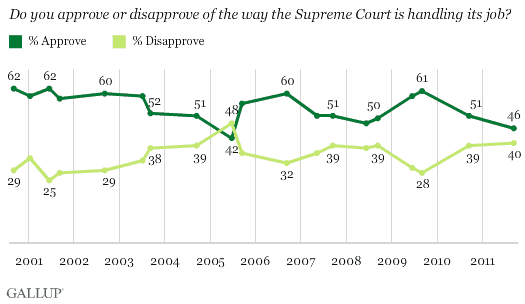
The new rating comes from Gallup's annual Governance poll, conducted Sept. 8-11. Americans have generally rated the Supreme Court positively; only once since 2000 have more disapproved than approved.
The drop in Supreme Court approval in the latest poll could be a result of the broader decline in Americans' trust in government in general, rather than a response to anything the court has done recently, because the court has been out of session since early summer.
Indeed, 63% of Americans in the same poll say they trust the judicial branch of the federal government, tying the low Gallup measured in 1976. However, Americans still have significantly more trust in the judicial branch than in either the executive or the legislative branch.
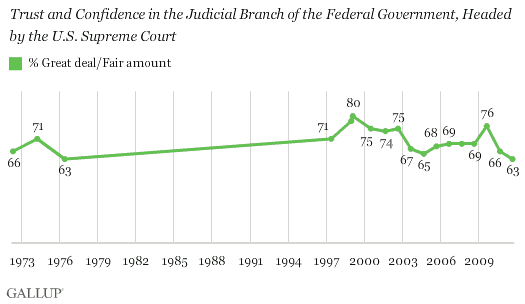
Declining trust in government institutions, including the Supreme Court, could be an outcome of Americans' broader dissatisfaction with the state of the nation in general and with the economy in particular.
Approval of Supreme Court Similar by Party
Republicans (50%), Democrats (46%), and independents (44%) have similar approval ratings of the Supreme Court, a departure from recent years.
The trend in approval by party shows Democrats' views becoming increasingly less positive, dropping from 75% approval in 2009 to 46% currently. Independents' ratings have also been trending downward the last two years, while Republicans are a bit more positive this year than last.
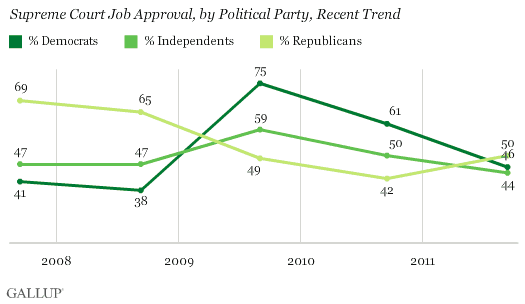
The rise in Democratic approval, and the fall in Republican approval, from 2008-2009 likely reflects the change in presidential administrations from George W. Bush to Barack Obama. Obama has made two appointments to the court since he took office, with Sonia Sotomayor replacing David Souter in 2009 and Elena Kagan replacing John Paul Stevens in 2010.
Those replacements did not dramatically alter the ideological composition of the Supreme Court, with two left-leaning justices replacing two left-leaning justices, but Americans' perceptions of the court's ideology have changed in recent years. A plurality of Americans, 42%, believe the Supreme Court's ideology is "about right," but more believe it is "too liberal" than "too conservative." That has been the case in each of the last three years -- the first three years of the Obama administration. During the latter part of the Bush administration, 2006-2008, the public was more inclined to believe the court was too conservative.
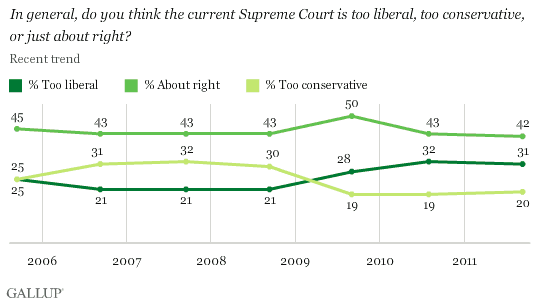
Half of Republicans believe the Supreme Court is too liberal, with most of the rest saying it is about right. Democrats are about equally likely to say the court is too conservative as to say it is about right, with a much smaller percentage saying it is too liberal. A plurality of independents believe it is about right, though more say it is too liberal than too conservative.
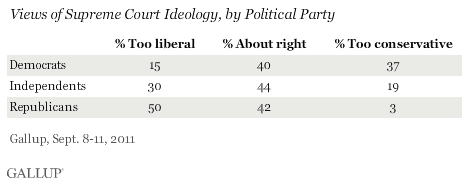
Implications
The Supreme Court is in theory a nonpartisan institution, one that is above politics. But the same forces that have caused Americans to lose trust in the presidency and Congress appear to be affecting the way Americans view the Supreme Court. In addition to the public's lower level of trust in the judicial branch of the federal government today than in recent years, the Supreme Court's approval ratings -- like those of Congress and the president -- are in the lower range historically.
Survey Methods
Results for this Gallup poll are based on telephone interviews conducted Sept. 8-11, 2011, with a random sample of 1,017 adults, aged 18 and older, living in all 50 U.S. states and the District of Columbia.
For results based on the total sample of national adults, one can say with 95% confidence that the maximum margin of sampling error is ±4 percentage points.
Interviews are conducted with respondents on landline telephones and cellular phones, with interviews conducted in Spanish for respondents who are primarily Spanish-speaking. Each sample includes a minimum quota of 400 cell phone respondents and 600 landline respondents per 1,000 national adults, with additional minimum quotas among landline respondents by region. Landline telephone numbers are chosen at random among listed telephone numbers. Cell phone numbers are selected using random-digit-dial methods. Landline respondents are chosen at random within each household on the basis of which member had the most recent birthday.
Samples are weighted by gender, age, race, Hispanic ethnicity, education, region, adults in the household, and phone status (cell phone only/landline only/both, cell phone mostly, and having an unlisted landline number). Demographic weighting targets are based on the March 2010 Current Population Survey figures for the aged 18 and older non-institutionalized population living in U.S. telephone households. All reported margins of sampling error include the computed design effects for weighting and sample design.
In addition to sampling error, question wording and practical difficulties in conducting surveys can introduce error or bias into the findings of public opinion polls.
View methodology, full question results, and trend data.
For more details on Gallup's polling methodology, visit www.gallup.com.
